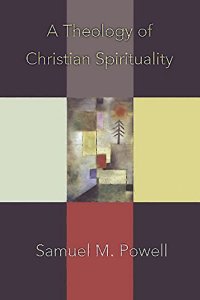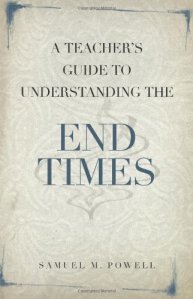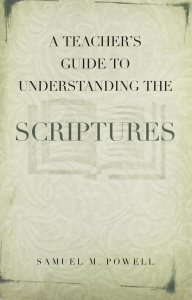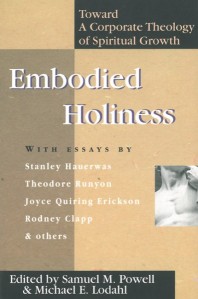Here’s my Amazon.com page:
The Impassioned Life
The Impassioned Life argues that theology’s task today is to rethink the nature of the emotions and their relation to human reason. Such rethinking is necessary because the Christian tradition feels ambivalently about the emotions. Armed with a commitment to body-soul dualism, many writers have equated the image of God with rationality and wondered whether emotion is an essential feature of human nature; however, the tradition has also affirmed the value of emotions such as love and compassion and has sometimes asserted the value of so-called negative emotions such as anger. The question, then, is whether the tradition’s pastoral insight into the importance of moderation and control of the emotions requires us to think dualistically about soul (identified with reason) and body (the seat of emotions). To answer this question, The Impassioned Life explores the vital resources of the Christian theological tradition and also of contemporary scientific and psychological research in order to achieve a more adequate theological understanding of the emotions and reason. At heart, it offers a holistic, integrated vision of the Christian life lived passionately in its full range of human feeling as life in the Spirit.

Available at Amazon, Barnes & Noble, and Fortress Press in two media:
- Hardback (ISBN 9781506410739)
- Electronic (ISBN 9781506408071)
About the cover art: This is a painting by Edward Coley Burne-Jones (August 28, 1833-June 17, 1898). It represents Temperantia, the personification of temperance, or moderation–one of the chief virtues traditionally associated with humanity’s emotional life.
Click to read:
Endorsements:
“There are many aspects of human life that are best understood from the joint perspectives of psychology and theology. Emotion is one of the most important, and Samuel M. Powell examines that here in a way that is thorough, judicious and entirely convincing. It is the best theological book on the subject so far.”
Fraser Watts
University of Cambridge
“Powell offers a wide-ranging yet insightful survey of how emotion and reason have been understood in Western thought. After assessing the major ideas he finds in Scripture, philosophy, historical theology, and contemporary science, Powell proposes ways that present-day people might best understand themselves. The Impassioned Live beautifully integrates theoretical and practical concerns to make it a must-read guide on the relationship between emotion and cognition!”
Thomas Jay Oord
Author of The Uncontrolling Love of God
“It may seem surprising that Christian thinkers would still elevate rationality and view the emotional life with deep suspicion, yet this tendency remains widespread. Samuel Powell here lays that myth to rest. With impeccable scholarship and an engaging narrative, he shows that Bible and theology, philosophy and science, all reveal emotion and reason to be interdependent. The result is a far richer and more attractive theological anthropology, with fascinating implications for our understanding of God.”
— Philip Clayton
Author of Transforming Christian Theology
Why did I write this book?
Because I wanted to produce a study in the Christian doctrine of creation, and specifically theological anthropology, and I was not satisfied with the general state of scholarship in this area. Many books treat the doctrine of creation in a strictly theological way–without incorporating the results of scientific study. I was convinced that today theological engagement with the sciences is both necessary and salutary. Other books on creation do engage the sciences; however, the majority of these deal with cosmological issues (Big Bang cosmology, quantum physics) or with evolutionary theory. As important as these studies are, they don’t address the concrete realities of human nature. I was initially interested in the Christian idea of freedom and then realized that, relative to freedom, the main theological and pastoral concern of the Christian tradition is emotion (construed broadly enough to include feelings, affects, impulses and desires). It is emotion that is morally and spiritually problematic. Human rationality, on the contrary, is rarely regarded as a problem. Quite the contrary, the Christian tradition has usually identified the image of God with rationality. So, I thought I could contribute to Christian thought by reviewing the concept of emotion in the formative centuries of Christianity and by incorporating the insights of scientific research into a theological understanding of emotion and its relation to reason.
Table of Contents:
- Introduction
- Reason and Emotion in Classical Philosophy
- The New Testament and Some Jewish Antecedents
- Patristic Theology
- Emotion in the Modern World
- Emotion from a Scientific Perspective
- Emotion and Human Morality
- Emotion and Cognition
- The Ecclesial Therapy of Emotion
- Reason, Emotion, and Theology
The Trinity

While we often think of theological doctrines as truths we believe, doctrines are also meant to be practiced. For many Christians, the doctrine of the Trinity feels very mysterious. What is the Trinity? Why is understanding the doctrine of the Trinity important? How does the Trinity influence our worship and daily life? Samuel M. Powell demystifies this foundational doctrine of the church in an accessible style that is easy to follow. The Trinity clarifies the numerous ways in which our Wesleyan worship, doctrines, and biblical interpretation are―when properly understood and articulated―thoroughly Trinitarian. Powell will move readers from understanding to intentional practice as he illuminates the far-reaching existence of the Trinity in every aspect of church life and thought.
Paperback (978-0834138414)*
Kindle (0834138417)
Available at Amazon
Available at The Foundry Publishing
The Trinity in German Thought
This book is about the Christian doctrine of the Trinity in German philosophy and theology. It covers some major thinkers: Martin Luther, G.W.F. Hegel, Friedrich Schleiermacher, Karl Barth, Jürgen Moltmann, Wolfhart Panenberg, and others. It argues there are three main ideas in that development: first, the way in which the Trinity has been seen as similar to the human self; second, the way in which differing understandings of revelation have affected people’s attitude toward the doctrine; and third, the ways in which differing understandings of the conception of history have affected people’s attitudes toward the doctrine.
Paperback
ISBN: 9780521092920
Available at Amazon.com
Available at Cambridge University Press
Reviews and endorsements:
“The most salient virtue of the lucid and reader-friendly text is that it provides an eminently useful map for reading modern Protestant thought in general, and modern trinitarian thought in particular.” Theological Studies
“The Trinity in German Thought is a superb analysis of the theological development of trinitarian theology in German Protestantism from the Reformation through the twentieth century. Powell’s thesis is solid. …Powell clearly demonstrates his thesis with critical insight and a breadth of knowledge that spans three centuries. His arguments are lucidly articulated and carefully nuanced. His grasp of diverse and difficult writers and the historical development of theological ideas is skillful and to be highly commended. Powell’s publication is a signifcant contribution to Trinitarian thought, with a critical awareness of theological, philosophical, and historical distinctions.” Toronto Journal of Theology
“A book that desperately needed to be written… engaging and stimulating…I highly recommend this book to professors and pastors alike who are interested in the many fascinating dimensions of the doctrine of the Trinity in contemporary debate.” Anglican Theological Review Review
“Powell has here presented a detailed and convincing study of the way in which the three key ideas – revelation, selfhood, and history – have influenced German trinitarian thought.” Theology Today
“With its breadth and clarity, this work is certainly to be recommended as a survey text for seminarians and others, and its usefulness as a reference work is enhanced by extensive footnotes citing German texts, and also by the inclusion of an extensive bibliography and index.” Asbury Theological Journal
“Particularly for students of Leibniz, German idealism in general, and Hegel in particular, this book will be an invaluable source of information about the historical and theological context within which these philosophies need to be interpreted.” Philosophy in Review
Participating in God
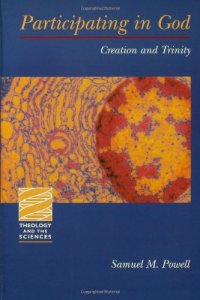
In this exciting work, Samuel Powell offers a new constructive and systematic vision of creation by interpreting it in terms of contemporary science and trinitarian theology.
Powell’s work unfolds in three stages, building on the multiple ways the doctrine of creation actually functions for Christians. He first analyzes its regulative dimension. Even in all the multiplicity of historical Christianity, he shows, the doctrine commits Christians to a particular set of normative beliefs about the world and God’s relation to it. Second, Powell builds on the doctrine’s hermeneutical potential. It allows Christians both to interpret the meaning of creation in terms of other prevalent philosophical, religious, or scientific ideas and also to interpret the world, as disclosed by scientific theory, in theological terms. In the heart of his book, Powell correlates creaturely characteristics with their participation in God through the trinitarian persons. Finally, in light of his findings, Powell drives home the often ignored ethical dimension of the doctrine, especially in relation to the environment, our consumerist lifestyle, and eschatology.
Powell’s bold proposal harvests from two of the most fruitful fields of recent theology ? trinitarian theory and religion-and-science and crafts a creative new vision of how we and all creation participate in the life and work of the triune God.
Paperback
ISBN: 9780800636029
Available at Amazon.com
Available at Fortress Press.
Endorsements:
“This is the right book on the right topic at the right time. By intimately linking Trinity and creation, Powell successfully integrates recent science with a distinctively Christian view of the nature and acts of God. His profound meditation on the world’s participation in God falls neither into a world-abandoning transcendence nor a God-obscuring spirituality of immanence. One by one, the core chapters explore the implications of trinitarian participation in the physical, biological, and human worlds…. I read this book with growing excitement: rarely does one find theology so powerfully and systematically applied to state-of-the-art scientific knowledge of the world.” Philip Clayton, Ingraham Professor, Claremont School of Theology
“I appreciate the way in which Powell uses the dialectic of identity and difference first to explain a communitarian model of the Trinity and then to set forth an up-to-date understanding of the natural world. He gracefully integrates current scientific data from the natural and social sciences with a conceptual scheme derived from philosophy and theology. I recommend this book…” Joseph A. Bracken, S.J., Brueggeman Center for Interreligious Dialogue, Xavier University, Cincinnati
A Theology of Christian Spirituality
While many would argue that spirituality is a necessary component of authentic human living, there is a lot of confusion over what spirituality is. According to Powell Christian spirituality has five aspects. 1.) Christian living is inescapably corporate. It is inseparable from the Christian community. 2.) It is inescapably corporeal–it cannot be separated from specific and embodied practices. 3.) It is participation in the Trinitarian life of God. Thus Christian living reflects both upon us and God. 4.) It has an eschatological existence. 5.) It is marked by our essential finitude under the conditions of sin.
Paperback
ISBN: 9780687493333
Available at Amazon.com
Available at Abingdon
Here’s a review by one blogger, Freedom in Orthodoxy
Endorsements:
“I am convinced that any truly helpful articulation of Christian spirituality must revolve around the good news that the Holy Spirit brings us to participate in the life of the triune God. By orienting A Theology of Christian Spirituality around this crucial theme, Samuel Powell directs our gaze toward the central insight that must inform all our discussions of what being spiritual really means.” Stanley J. Grenz, Pioneer McDonald Professor of Theology, Carey Theological College, Vancouver BC, Professor of Theological Studies, Mars Hill Graduate School, Seattle Washington
“In a world in which the language of spirituality has spun out of control, Sam Powell valiantly rescues that language to remind us that, for Christians, we must know what we’re doing when we talk about God if we are to talk about spirituality.” Stanley Hauerwas,Gilbert Rowe Professor of Theological Ethics in the Divinity School at Duke University, Durham, North Carolina.
“Exploring the theology and practices of Christian spirituality throughout the ages, and taking into account a contemporary, even postmodern, context in which pluralism, the reality of a post-Christian America, and the confusion of an American ethos with a Christian one so often occurs, Sam Powell has authored an engaging and very readable work that will, no doubt, serve as a basic theological account of Christian spirituality in classrooms across the nation.” Kenneth J. Collins, Professor of Historical Theology and Wesley Studies, Asbury Theological Seminary, Wilmore, Kentucky
Discovering Our Christian Faith
Theology is the knowledge of God; but unlike other types of information, which simply provide a broader understanding of a topic, theology is intimately connected to how we exist and conduct ourselves in the world. With this in mind, it’s important that we, as Christians, understand our beliefs in order to value their impact and practice them effectively.
Discovering Our Christian Faith is an introduction to Christian theology. It explores the Bible’s amazing story, beginning with creation and ending with the return of Christ. Dr. Samuel Powell presents the leading doctrines of Christianity and explores how they have been shaped throughout the centuries. With thorough examination and academic scholarship, he outlines the creedal statements of Wesleyan-holiness churches and explores the importance of eschatology in every doctrine, seeking to maintain the coherence and systematic character of Christian belief. In addition to a section on ethical dimensions of the doctrines discussed, each chapter includes a hymn by John and/or Charles Wesley that expresses the theme of the chapter.
Discovering Our Christian Faith offers students, scholars, pastors, and teachers the opportunity to engage and unite their faith and intellect in an act of worship. With challenging insight and enriching evidence, it brings readers face to face with the beginning and end of our being by seeking to understand and encounter the knowledge of God.
Cloth
9780834123540
Available at Amazon.com
Available at Nazarene Publishing House
Click here to read an excerpt.
Endorsements and reviews:
“This may well be the best introduction to theology from a Wesleyan perspective. Powell’s writing is simple, yet profound. He emphasizes theology as worship, not merely as a philosophical exercise. Each chapter includes a Wesley hymn that expresses the theme of the chapter. In this introduction to theology, Powell rarely quotes secondary sources. His theology is post-modern and relational, but not process theology. The result is a consensus theology based on scriptural authority.” Vic Reasoner, Arminian Magazine
“Powell’s book is an important addition to the rather scant list of resources for teaching theology to college students and laity from a historic Wesleyan perspective. He is upfront about his stance as one who stands “within the Wesleyan tradition of Protestant Christianity.” His goal is to describe “normative Christian faith,” but working consciously from a defined perspective. He clearly understands that for two hundred years Wesleyans have likely learned their theology best by singing it, so he sets the theological agenda for each chapter by beginning with a Wesley hymn. . . . This is an impressive teaching tool for the church, and I recommend it without hesitation.” Stephen Gunter, Professor of Evangelism and Wesleyan Studies, Duke Divinity School
A Teacher’s Guide to Understanding the Trinity
Why is the doctrine of the Trinity important? Is it just one more thing to memorize and forget about later, or is it something much more? This concise, in-depth book explores this seemingly elusive doctrine, its history, and its meaning to the life of faith. With exceptional insight and scholarly precision, Samuel Powell brings this doctrine into sharp focus and demonstrates that more than an ancient relic of the church, the doctrine of the Trinity is woven into the fabric of almost everything Christians believe. At the very nexus of salvation, the Trinity is a stirring and poignant model for love and relationship within community.
Paperback
9780834125599
Available at Amazon.com
Click here to read an excerpt.
A Teacher’s Guide to Understanding the Sacraments
Sprinkle or immerse? Wine or grape juice? We are talking about sacraments in the Protestant Christian faith. There are so many questions, opinions, and arguments that there has to be an answer. Are sacraments needed for salvation? Do I need to be a church member to take communion? Who can perform a baptism?
Teacher’s Guide to Understanding the Sacraments gives an explanation about how churches came to practice the holy rituals in certain ways and why they are so important. By looking at the Bible, theology, and tradition, Samuel M. Powell reveals the true nature and necessity of the sacraments.
Paperback
9780834125605
Available at Amazon.com
Click here to read an excerpt.
A Teacher’s Guide to Understanding the End Times
Today, everybody seems to be fascinated with the end times. Scores of movies, books, and even mini-series revolve around an apocalyptic event where humanity is threatened, almost destroyed, or completely wiped out. Usually, through human ingenuity, the people of earth save themselves or rebuild at the end of the plot. But what does the Bible actually say about the end times?
In A Teacher s Guide to Understanding the End Times, Samuel Powell reveals how to interpret the end times through history, theology, the Old and New Testament, current events, and interpretation guides. With this guide, learn how to apply Biblical texts to today.
Paperback
9780834125612
Available at Amazon.com
Click here to read an excerpt.
A Teacher’s Guide to Understanding the Scriptures
From differences over which translation is best to disagreements about what the Scriptures say about women in ministry, homosexuality, and creation, the Bible continues to be at the center of debate for many Christians.
In this enlightening book Samuel Powell introduces a Christian doctrine of Scripture that sweeps away much of the controversy. By giving special attention to the authority, revelation, and inspiration of the Bible, Dr. Powell provides a concise, but scholarly, understanding of the Scriptures that is historically well-grounded and theologically sound.
Written from a Wesleyan perspective, this book is an indispensable resource for pastors, teachers, and small-group leaders. Equipped with a bibliography for further study, it is an ideal teaching tool and a valuable reference for anyone wanting to know more about the nature and purpose of the Bible.
Paperback
9780834128842
Available at Amazon.com
Click here to read an excerpt.
Endorsements:
“This clearly written and clearly articulated writing will prove both timely and invaluable for anyone who takes scripture seriously in the local church. The result of reading this text should prepare church leaders, teachers, and members to read the word of God, the Bible, expecting scripture will reveal the true Word of God, Jesus Christ.” Dean G. Blevins, Ph.D, Director, Master of Arts in Christian Formation and Discipleship, Nazarene Theological Seminary
“In a carefully crafted work on the doctrine of Scripture, Sam Powell invites readers to think about the Bible as a divine and human book, the Word of God and the word written by human beings in ancient cultures. This engaging book will no doubt become an important teaching tool and lively conversation starter in the days ahead.” Kenneth J. Collins, Ph.D, Professor of Historical Theology and Wesley Studies, Asbury Theological Seminary
Embodied Holiness
With Michael E. Lodahl
What Does the Body – Physical & Social – Have to Do With Holiness?
Modern Western Christianity has too often seen holiness and growth in Christian character as exclusively an individual and “spiritual” (or non-physical) matter. Centered on a suggestive proposal about “the sanctified body” by Stanley Hauerwas, the essays in this provocative volume argue contrary to that tendency, insisting that any genuine Christian holiness is vitally related to our physical and social bodies. Along with way, the essayists trace crucial confusions in ecclesiology, prayer and social action to the distorted nonbodily understanding of sanctification.
Essays and authors include:
• “The Sanctified Body” by Stanley Hauerwas
• “The Human Person as Intercessory Prayer” by Craig Keen
• “Tacit Holiness” by Rodney Clapp
• “Holiness as the Renewal of the Image of God in the Individual & Society” by Theodore Runyon
• “Paying Attention: Holiness in the Life Writings of Early Methodist Women” by Joyce Quiring Erickson
• “The Once & Future Church Revisited” by Michael G. Cartwright
• “‘And He Felt Compassion’: Holiness Beyond the Bounds of Community” by Michael E. Lodahl
• “A Contribution to a Wesleyan Understanding of Holiness & Community” by Samuel M. Powell
Paperback
9781620322475
Available at Amazon.com
Available at Wipf&Stock
Holiness in the 21st Century
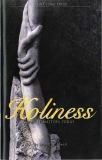
Holiness in the 21st Century is a short monograph intended for pastors and lay people. It briefly discusses God’s holiness; holiness and election, consecration, and purity; righteousness; holiness and the Trinity; holiness and the ethical life; holiness and sin; and becoming holy in the church.
Available from Point Loma Press or contact me.

